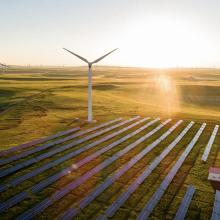NESO Appointed by Ofgem as Interim Data Sharing…
1 Apr 2025 - 3 minute read

Achieving a clean power system by 2030 will require Great Britain to connect around 210 – 220GW of new zero-carbon generation sources to provide electricity to the grid. To help facilitate these connections, our Grid Connect X innovation project is introducing a new Grid Connection Simulation Tool to increase the speed in which renewable energy sources connect to Great Britain's National Electricity Transmission System (NETS).
The Grid Connection Simulation Tool will act as a secure platform for plant owners and consultants to carry out wider system Electromagnetic Transient (EMT) analysis without accessing sensitive data of other users in the system. Historically, sharing grid connection models involved complex negotiations around non-disclosure agreements and intellectual property (IP) protection. The Grid Connections Simulation Tool will facilitate multi-vendor participation, secure data sharing, and reduce reliance on non-disclosure agreements to streamline grid connection studies.
As we become more reliant on zero-carbon generation sources such as wind and high voltage direct current, we need to effectively manage the transition towards high inverter-based generation to continue delivering Great Britain’s world leading reliability standards. The August 2019 power outage highlighted the need for robust Electromagnetic Transient (EMT) models to ensure grid stability. The platform removes the need for ‘best guess’ using generic models by ensuring the EMT models used in grid connection studies are accurate and reflective of their actual behaviour.
Throughout the duration of the project, you’ll be able to see a series of reports that will share project outcomes, lessons learned, and best practices on the ENA portal.
In our Clean Power 2030 report, we consider the reforms required to the connections processes (both for queue management and wider network related reforms) to deliver the right technology, in the right location, at the right time.
We’re consulting on our plans to reform the connections process by reducing and reordering the queue to prioritise ready projects as well as aligning to locational, and technology needs for the future energy system.